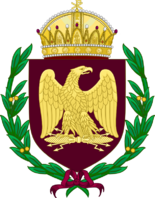Monarchy of Latium
| Emperor of the Latin Empire | |
|---|---|
| Imperator Latinus | |
Imperial | |
 | |
| Incumbent | |
 | |
| Diana I Anicia since 12 April 1945 | |
| Co-incumbent | |
 | |
| Jacobus VI Claudius since 29 July 1993 (junior emperor until 1 January 2000) | |
| Details | |
| Style | His Imperial Majesty |
| First monarch | Gaius Caesar |
| Formation | c. 200 BC |
| Residence | Palace of Augustus, Palatine Hill, Castellum ab Alba |
| Website | www.imp.gov.il |
| This article is part of a series on the |
| Politics of Latium |
|---|
 |
The Latin Emperor (Latin: Imperator Latinus) is the head of state and chief executive of Latium. Officially the title of the monarch is Emperor, though it is common to use: Caesar, or Augustus (if bestowed the title). The first Latin Emperor was Gaius Caesar around 200 BC. The current Claudii ruling family first ascended to the throne in the 4th century, though only recently came back to the throne. There are currently three monarchs, Diana I Anicia has reigned as senior empress since 12 April 1945, while her eldest son Jacobus VI Claudius was reigned as co-senior emperor alongside his mother since 1 January 2000. On 28 February 2019, Constantine XX Claudius was acclaimed junior emperor.
The monarchy is typically composed of the reigning monarch and his or her spouse and children, and the entire imperial household which is comprised of staff and those who assist the monarch in carrying out their constitutional duties. On occasion, those not among the listed may be included due to the monarch's discretion regarding the composition of his or her household. The monarchy is always represented by the reigning monarch, his or her spouse and eldest children. Since December 2017, the monarchy is represented by Emperor Constantine XX, Empress Alazne, Empress Stephania, the Empress Mother, and, on occasion, Princess Maria will attend functions on behalf of the Imperial Family.
The Latin monarchy traces its earliest history to the Latin kings of Castellum, and the subsequent union of Castellum and Alba. The first Latin Emperor arose after the union of Latin peoples in ancient Latium, which gradually grew to establish an intercontinental empire covering Belisaria to northern Scipia.
History
The position of emperor is one of the oldest in the Latin State, with its creation coming sometime around 37 AD, following the unification of greater Latium.
The role of the Emperor has shifted from one of power to weakness back to power, based on the individual ruling. Most often the Monarch held near absolute power; at other times, the monarch simply held the abilities that other nobles allowed. The 13th century was the initiation of the peerage system and hereditary Lord Palatinates, saw the monarch delegate powers to various nobles, though over time these titles mostly have merged back into the Crown.
Role in Government
Today the Emperor acts as the head of state and and nominal head of government. His many constitutional powers from the earliest days of the State have gradually transferred back to the Senate, but the position as Head of the Senate, allows the Emperor oversight into the legislative side of the Latin Government, along with his role as chief executive and commander-in-chief of the armed forces.
Executive Powers
The Monarch serves as the chief executive, and shares many of the same powers as a president in a presidential system. Court consists of the immediate staff of the Monarch, including multiple layers of support for numerous policy advisors across both domestic, foreign and other topics, Imperial Counsel, and press office. These top aides and the Imperial Offices are headquartered at the Palace of Augustus in Castellum.
The Monarch holds the ability to direct the executive Imperial Office through executive orders that are grounded on constitutionally granted executive power. The emperor can, in effect, rule purely through the use of degree or edict. Monarchs have the power to appoint any individual to the Sacred Assembly, or other positions and councils that make up court. In practice, the Senate typically approves appointments to the College of Praetors.
Legislative Powers
The Monarch plays a key role in legislation by virtue of his or her status as Princeps Senatus (First Citizen of the Senate). This role enables the Monarch to have a voice in the legislative agenda, veto bills, convene and adjourn the Senate, and even introduce legislation. The Monarch continues to retain substantial political authority and activity in the legislative process.
The Monarch may, in his or her sole discretion, grant or withhold assent to legislation passed by the Senate.
Judicial Powers
The is constitutionally the chief arbiter of justice in Latium. He appoints judges, state prosecutors and attorneys, who typically serve at the emperor's pleasure, though generally for a term of at least five years. The emperor has the right to sit on a judicial bench or preside as judge on any matter, however this is generally only done in extreme circumstances such as extraordinary cases and high crimes pending before the Trigintiviral Court. The emperor may also grant pardons and reprieves.
Military and foreign policy abilities
The Monarch serves as the supreme commander of the Latin Armed Forces. For formal declarations of war the Emperor must seek the approval of the Senate, which is in practice a formality. The Emperor has ultimate responsibility for direction and disposition of the military. The present-day operational command of the Armed Forces is normally exercised through the War Bureau and the Master of Soldiers.
Along with the armed forces, the Monarch also directs foreign policy. Through the Bureau of Foreign Affairs and the War Bureau, the Emperor is responsible for the protection of Latins abroad and of foreign nationals in Latium. The Monarch decides whether to recognize new nations and new governments, and negotiates treaties with other nations, which become binding on the Latium when approved by a majority vote of the Senate.
The emperor may also employ "executive agreements" in foreign relations. These agreements frequently regard administrative policy choices germane to executive power; for example, the extent to which either country presents an armed presence in a given area, how each country will enforce copyright treaties, or how each country will process foreign mail.
Titles, Styles and Honors
For most occasions a simplified title is used when addressing the emperor. This simplified version is "Latin Emperor". The traditional full title of the Latin Emperor is:
- His Imperial Majesty, the Most Sacred and Christian, Most Pious and Blessed, Most Serene and Noble Augustus Crowned by God, Unconquered and Universal Emperor, King of Alba, and of the Sabines, Lord of the World, Father of the Fatherland, First Citizen of Senate, Companion of Christ, Equal to the Apostles, Sword of Christ, and Protector of the Church.
Sovereign's may be awarded additional titles to those above upon certain conditions. For example, when a reigning sovereign is born during the reign of their preceding father or mother "Born in the Purple" (Latin: Purpurogenitus) is often included. The most recent inclusion of this into the Imperial titles and styles was during the reign of Emperor Jacobus VI Claudius, who was born in 1963 during the reign of his mother. Any title not included in the official role of titles does not mean that the title has been abandoned only that a monarch simply has not included it to be used in diplomacy or matters of state. A number of titles have been conferred upon the emperor by the pope, such as the 17th century addition of "Noble Augustus Crowned by God".
It is acceptable and common to address the emperor simply as Caesar or Augustus. The former derives from the cognomen of Gaius Caesar, made famous as the first emperor of a united Latium in the ancient region of Alba. It was the preferred title of Latin monarchs following Caesar and into the Imperial era. Upon one's ascension to the throne, they assume the name "Caesar". For example, prior to becoming Emperor, the birth name of Constantine XX Claudius was Gaius Claudius Anicius Sabinus Constantinus Felix. Upon his ascension, his name became Imperator Gaius Claudius Anicius Sabinus Constantinus Felix Iosephus Caesar Augustus. It is common practice to address the Monarch as ''Your Imperial Majesty'' upon first instance, and thereafter as ''Caesar'', or as "Augustus". It is also acceptable to address the Emperor as ''Your Clemency'', ''Your Eternity'', or ''Invincible Emperor''.
Title of Heir Apparent
Traditionally, the eldest son of the reigning emperor is afforded the title of Prince of Youth (Princeps Iuventutis), or rarely Princess of Youth, to designate their status as emperor-designate; most often conferred upon the individual once they are baptized. The heir apparent will also hold the title of Destined to be Emperor (Imperator Destinatus) once they are baptized. It is custom to award the heir apparent the titles of Duke of Galata and Duke of Velia upon his birth. In both the past and modern day, the use of the duchy is provided in order to provide funds for the heir apparent.
Should a monarch succeed to the throne without children or an heir apparent not being clear, the reigning monarch may confer any titles they wish upon the heir presumptive.
Junior emperor
At times, the heir apparent or presumptive will be elevated to the role of junior emperor. This has occurred numerous times since the imperial era, and on five occasions since 1844. Since 1844, the junior emperor has reigned from Leonopolis, and directly governed Perateia. The junior emperor may also undertake nearly all duties as the senior or sole emperor, though because of the nature of the imperial relationship, typically plays a subservient role in government outside of Perateia, such as in foreign affairs. However, the junior emperor may, and often does, partake in sole state visits. The junior emperor serves as imperial regent should the senior emperor be rendered incapable or otherwise unable to undertake his obligations. The junior emperor may also appoint consuls, and appoints one of the two annual ordinary consuls, and may himself serve as consul.
Coronation
Acclamatio
Succession Laws
Succession to the Latin throne follows male preference primogeniture. The law governs that a Monarch's sons and their lines of descent all come before that dynast's daughters and their lines. Older sons and their lines come before younger sons and their lines; older daughters and their lines come before younger daughters and their lines. This has been the accepted method of succession since the 1353 Acts of Succession, which have been amended by Imperial Decree at various times, most recently in 1843. A series of informal rules also dictate succession to the throne, dictating that one must also be: of legitimate birth, Imperial Catholic, and of Latin descent. The throne is never vacant, meaning that a new monarch immediately succeeds to the throne upon the death of his or her predecessor.
Formerly, in the event of the complete or near exhaustion of the Imperial line, past versions of the AOS allowed the Senate to call for a grand council to determine who the succeeding monarch will be, placing the throne in a temporary vacancy. While this is no longer valid law, the most recent instance of a grand council being invoked was after the death of Emperor Michael VII in 1842 where the Senate debated between the succession of Prince Leo of Ghant (Michael's nephew) or Andreas Anicius (Michael's cousin).
Any individual in the line of succession may disclaim their succession rights at anytime after reaching the age of majority. This is done by delivering a Notice of Disclaimer to the Master of Offices and Count of Petitions, who then presents the Notice to the reigning Monarch. Any disclaimer only removes succession rights from the forfiter, and no then living children; however, after born children will not hold succession rights.
Imperial consent to royal marriages
By the Acts of Succession, all individuals holding an imperial title must obtain the Monarch's consent before marrying. Marriage without the emperor's consent disqualifies the person and his or her descendants from the marriage from succeeding to the throne – though this doesn't necessarily invalidate the marriage.
Treason
Under an 1843 Imperial decree, further amended in 1956, it is considered high treason to "endeavor to deprive or hinder any person who shall be the next in succession to the throne...from succeeding...to the imperial crown." The penalty if found guilty is execution by firing squad or hanging. Furthermore, it is considered high treason to murder or otherwise do or intend to mean harm to the heir apparent or his spouse. It is considered high treason to violate any female member of the Imperial Family, including spouses. If a dynast is found guilty of treason, he or she is barred from succession.
Residences
The Emperor's official residence in Castellum is Palace of Augustus, on the Palatine Hill. It is the site of most state banquets, investitures, Imperial christenings and other ceremonies. The Sovereign's official residence in Ascanium is Palatium Purpura. The emperor stays in Ascanium for at least one week each year.
Palatium Aureum, the principal Imperial residence, located in Castellum.
Palatium Supranio, historical seat of the Duke of Adrianople and private residence of the Claudian dynasty.
Villa Clusia, private residence of the Claudian dynasty, located in Villa Clusium, near Arretium.
Palatium Ravennae is a private residence of the Claudii family, located outside of the Ravenna city limits.
Insula Ceos, an island of Imbros featuring the Villa Theophylacti, private island owned by the House of Claudius.







